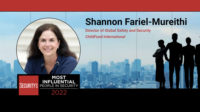Martin Gill was interested in crime before he could walk. “To me, this industry is never something I fell into; it was always something I wanted to be involved with,” he says. “So, when people say, ‘I don’t know what I want to do with my life,’ I don’t understand that. I just ask, ‘What are you interested in?’ And whatever the answer is, do that. For me, it was a fascination with crime.”
As a youngster, he saw the aftermath of a burglary at a shop in town and was fixated on why such a thing happened and what prevention tactics could have worked to stop a victim from being so traumatized. Gill says he’s convinced a family gene — several of his family members have worked in law enforcement and crime prevention — carved out his path for a life of researching crime, protection and security.
“I was always fascinated and intrigued by offenders who took risks with their freedom for financial or other gains, and I always wondered at their logic — because to me the downside seems so negative, whether it be losing your freedom, hurting or harming someone or something, and the upside to me didn’t seem to outweigh those negatives,” he says.
Gill pursued a Ph.D. in criminology and eventually became head of the department and Professor of Criminology at the University of Leicester, specializing in business crime and security management for more than 10 years. While head of the department, Gill was approached by the Vice Chancellor to test his interest in becoming Dean. “I realized then that if I went down the university administration route, I would lose my direct contact with the subject area I am most passionate about,” he recalls.
In 2002, Gill left the university full time to start Perpetuity Research, a research organization specifically focused on crime and security. In addition to Perpetuity Research, Gill has immersed himself in the industry, partnering and volunteering for associations and industry groups, including working with the ASIS Foundation (where he is Vice President), and serving as a Visiting Chair at University College London, as well as an Honorary Chair at the University of Leicester.
Throughout his academic career and projects at Perpetuity Research, Gill has been published extensively on security issues, interviewing robbers, burglars, fraudsters and murderers in prisons, and even accompanying shoplifters on their pursuits — all in an effort to learn the motivations behind crimes and what works as effective mitigation. He edits the “Handbook of Security” (the third edition was published in June 2022), which is an extensive collaboration with security subject matter experts and includes 45 chapters from leading researchers and scholars.
For the past 18 years, Gill has pursued an annual Security Research Initiative (SRI), sponsored by security companies and stakeholders each year on a different topic. This year’s topic, which will publish in September 2022, is focused on the security function’s influence on security budget at the enterprise level across sectors.
Almost 10 years ago, Gill embarked on an SRI report that would become the inspiration and impetus behind him founding the Outstanding Security Performance Awards (OSPAs), the Tackling Economic Crime Awards (TECAs) and, more recently, the Cyber OSPAs. “We conducted a worldwide survey which included asking security professionals about how they received recognition for good security work,” Gill says. A disproportionate number of respondents noted a gap for a credible awards program without self-serving motivation. The results inspired Gill to hire someone to research awards programs and identify what made an awards program credible, ethical and transparent.
“From this research came the concept for the OSPAs,” Gill shares. The idea behind the annual OSPAs is to offer an independent, unaffiliated awards program built on standardized principles. Since its founding in 2015 with the first Norway-based OSPAs, the program now recognizes superior security projects and professionals in 15 countries with Ireland, New Zealand, Canada and France just launched in 2022. Ultimately, it’s Gill’s goal to have a global OSPAs, where individual OSPA winners from each country are then judged for global recognition.
“A wonderful thing about these awards is you really get to see what an incredibly dynamic, influential, competent world security is on the physical, cyber and economic side. The very best of these worlds are very, very good indeed and I think, in general, the security industry is very bad at saying how good it is,” Gill says. “And it’s a bad thing to be bad at. Our goal is to throw some much-needed light on outstanding performance.”
Aside from expanding security performance awards around the world, Gill continues to focus on conducting meaningful research projects that make a difference. According to Gill, one of the most important conclusions that he has come to during his career thus far from his first-hand research — as well as others — is that security measures are fundamental to preventing crime, but security works only when it is good.
“For me, one of the most interesting findings I have made is that offenders do weigh the opportunities of committing a crime to various degrees of sophistication and determine their chances of getting caught. In other words, they do assess risk,” Gill says. “And herein lies the opportunity for the security world, because you can weigh your options against the person committing the offense. I’ve interviewed offenders having committed a range of offenses and what I have found is that their judgement or decision to commit a crime is greatly affected by the quality of security that is there. Security being there is not in itself a big deal, but it’s actually the quality of that security — and if the quality of that security is enough to impact that decision-maker on whether to commit a crime, then that’s where the opportunity lies for the security world.”




